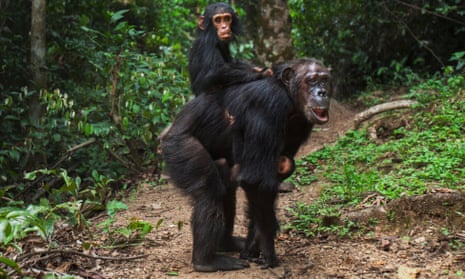Female chimpanzees in the wild undergo the menopause and live for a lengthy period afterwards, researchers have found, suggesting the phenomenon is more widespread than previously thought.
Quite why some female mammals have a long period of life once reproduction is off the table has long puzzled experts: not only was it previously thought to be confined to humans and five species of whale, but its purpose has also been highly debated.
Now scientists say they have the first evidence of the phenomenon in a non-human primate in the wild.
“Menopause ends reproduction around the age of 50 in both humans and wild chimpanzees,” the researchers report, adding they found it was not unusual for chimpanzees – like humans – to live longer.
Writing in the journal Science, researchers report how they studied 185 females in the Ngogo community of wild chimpanzees in Kibale national park, Uganda, from 1995 to 2016.
The team found the probability of giving birth fell after chimpanzees reached 30 years old, and no births occurred in animals aged above 50.
However, 16 females lived beyond this age. Indeed the analysis suggests females lived about one-fifth of their adult life in a post-reproductive state.
The team also analysed urine samples from 66 female chimpanzees, revealing hormonal changes with age similar to those seen in humans during the menopause.
But previous studies have not found substantial numbers of wild female chimpanzees living in a post-reproductive state. The team say one possibility is that favourable conditions at Ngogo allow more females to live until older.
Similar arguments have been made to explain why a number of species, including chimpanzees, undergo menopause in captivity.
However, the team say there is another possibility: a lengthy period of life after reproduction ends may have been common throughout chimpanzees’ evolutionary history, but recent human activity at sites other than Ngogo, resulting in disease and habitat loss, has hindered the survival of wild populations, including older females.
Yet questions remain. “It is not obvious how selection can favour the extension of lifespan past the point at which individuals can no longer reproduce,” said Dr Kevin Langergraber, co-author of the study at Arizona State University.
Langergraber added the “grandmother hypothesis” – that posits the phenomenon occurs to enable older females to support their extended family – seems unlikely in chimpanzees given their social dynamics, but he noted it may occur to reduce conflict with younger females over mates.
Dr Megan Arnot, an evolutionary anthropologist at University College London, added the study supports the idea the human menopause might occur because our lifespans today are longer than in our evolutionary past, and the female reproductive system has just not “caught up”.
But, she added, it does not explain why human menopause seems stuck at midlife, or why humans live so long beyond it.
“There’s still a long road to fully understanding menopause and the post-reproductive lifespan in humans,” she said.










